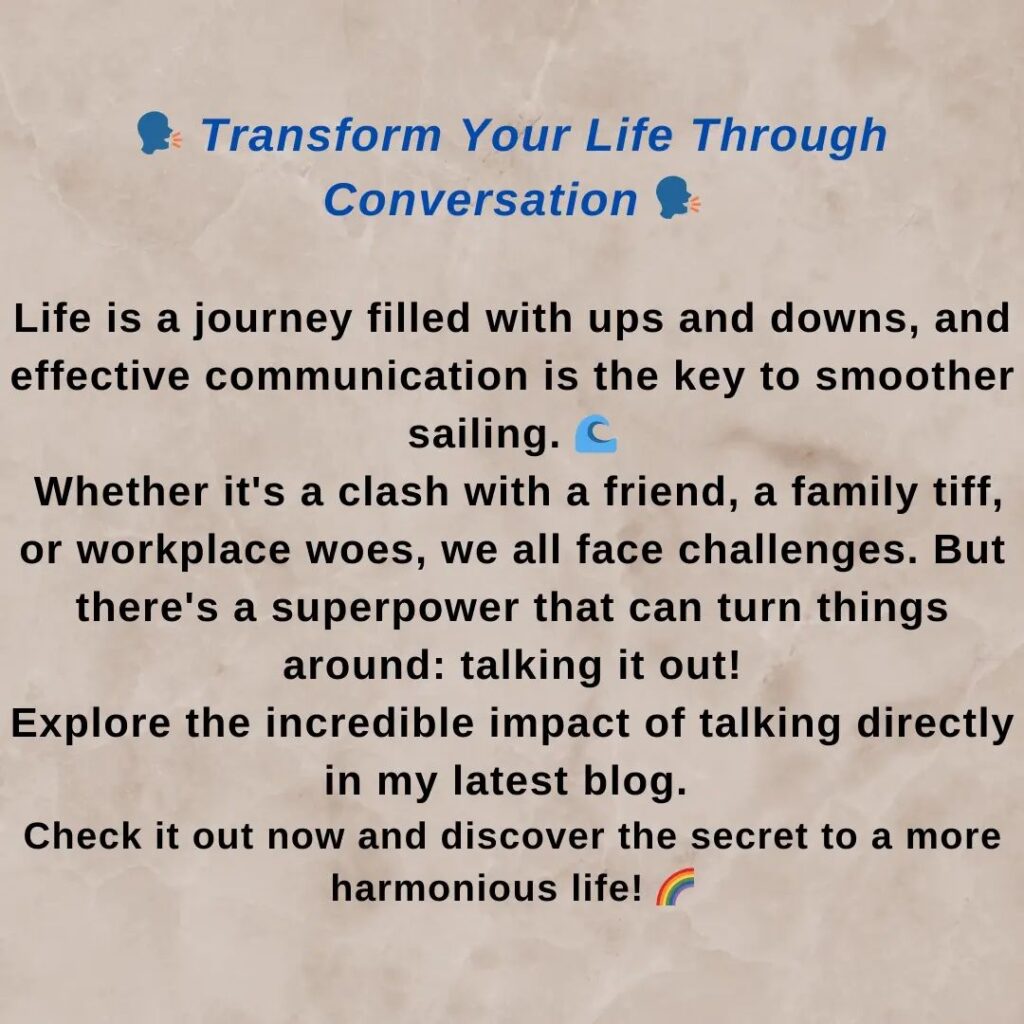“Navigating Misunderstandings Through Direct Conversations /Communication”
“Discover the power of addressing issues directly with the individuals involved. Learn how open and honest communication can lead to resolutions and stronger relationships.”
Unlocking the Power of Direct Conversations
“In life’s journey, we all face moments when our communication skills are put to the test. One such challenge is dealing with misunderstandings in our relationships, whether they’re personal or professional. Often, we tend to discuss these issues with friends or family, seeking advice or simply venting our frustrations. While this can be helpful at times, there’s a more direct way to solve problems: talking to the person involved.
“How Talking It Out Can Change Your Life”
Life is full of ups and downs, and one of the challenges we all face is how to communicate effectively when things get tough. Whether it’s a disagreement with a loved one or a problem at work, our first instinct is often to seek advice or vent to a friend. While talking to someone else can sometimes be helpful, it’s not always the best solution.
“Transform your relationships with the power of open and honest conversations. Learn why talking directly to the people you have issues with can change your life.”
Life can be tricky, especially when it comes to our relationships. Misunderstandings can lead to negative vibes and a spiral of negativity. But what if there was a simple way to make things better? Imagine this: instead of talking to others about your problems, you talk directly to the person you’re having issues with. It might sound scary, but having an open and honest conversation can be truly transformative. Discover the power of talking it out and changing your life for the better.
Life is a journey filled with twists and turns. Along the way, we encounter various challenges that test our abilities, and one of the most significant challenges is effective communication. Whether it’s in our personal or professional lives, misunderstandings and conflicts are almost inevitable.
When faced with such challenges, many of us turn to friends, family, or colleagues for advice and support. We seek external opinions, vent our frustrations, and hope to find a solution through these discussions. While talking to someone else about our problems can sometimes be helpful, it’s not always the most effective approach.
Imagine this scenario:
you’re having issues with a friend, a family member, or a coworker. There’s tension, misunderstandings, and negative vibes. Your first instinct might be to confide in someone else, sharing your grievances and seeking their perspective. It’s a natural response, as we often crave validation and understanding from those close to us.
But what if there was a more direct and impactful way to address the issue? What if, instead of talking to others about the problem, you initiated an open and honest conversation with the person you’re having issues with?
This approach might sound intimidating, even scary, but it has the potential to be truly transformative. Here’s why:
Unlocking the Power of Direct Conversations:
When you engage in a direct conversation with the person involved, you create an opportunity for both parties to express their thoughts and feelings. It’s a chance to clear up misunderstandings, share perspectives, and work towards a resolution.
The Secret to Stronger Relationships:
Communication is the cornerstone of any healthy relationship. By addressing issues directly, you demonstrate your commitment to understanding and resolving problems, which can lead to stronger and more resilient connections.
Direct Conversations: Why Talking Matters
Speaking openly and honestly can have a profound impact on your mental and emotional well-being. It relieves the burden of unresolved issues, reduces stress and anxiety, and fosters a sense of empowerment and control over your life.
From Conflict to Connection through Direct Conversations
What might initially seem like a conflict can often be an opportunity for deeper connection. When both parties engage in open dialogue, they can discover common ground, empathy, and shared solutions.
So, why is talking directly to the person involved so effective? First, it cuts through the noise and eliminates the risk of miscommunication that can occur when discussing issues through intermediaries. Second, it demonstrates your willingness to take ownership of the problem and your commitment to finding a solution.
While it’s essential to approach these conversations with empathy and an open heart, the act of initiating a dialogue can be a catalyst for positive change. It’s a step towards resolution, understanding, and personal growth.
Parent-Child Connections through Direct Conversations
Direct conversation plays a crucial role in nurturing the parent-child relationship. By engaging in open and honest communication, parents and children can develop a strong bond built on trust and understanding. To learn more about building strong parent-child connections, read our article here.
Next time you find yourself entangled in a web of misunderstandings or conflicts, consider taking the direct route. Instead of discussing the issue with others, reach out to the person involved and start a conversation. You might be surprised at how this simple act can effect a lot.
Do Follow for More Tips and Inspiration:
- Instagram: Follow us on Instagram
- Pinterest: Follow our Pinterest profile
FAQs
- How can direct communication help resolve misunderstandings in relationships?
- What are the benefits of addressing issues directly with the individuals involved?
- How does open and honest conversation contribute to building trust in relationships?
- What strategies can be used to initiate a direct conversation about sensitive topics?
- Are there any potential challenges or risks associated with direct communication?
- How can direct communication improve workplace dynamics and productivity?
- What role does active listening play in effective communication?
- Can direct communication lead to conflict resolution in professional settings?
- Are there any cultural or societal factors that influence the effectiveness of direct communication?
- How can individuals develop the confidence to engage in direct conversations about challenging topics?
